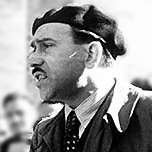Walter Audisio
| Walter Audisio | |
|---|---|
 | |
| Italian Chamber of Deputies | |
|
In office 1948–1963 | |
| Constituency | Alessandria |
| Italian Senate | |
|
In office 1963–1968 | |
| Personal details | |
| Born |
June 28, 1909 Alessandria, Italy |
| Died |
October 11, 1973 (aged 64) Rome, Italy |
| Resting place | Cimitero Monumentale del Verano |
| Nationality | Italian |
| Political party | Italian Communist Party |
| Occupation | Politician, Revolutionary |
| Military service | |
| Nickname(s) | Comandante Valerio |
| Rank | Lieutenant Colonel, Inspector |
| Unit |
|
Walter Audisio (June 28, 1909, Alessandria – October 11, 1973, Rome) was an Italian partisan and communist politician. According to the official version, he was responsible for the death of Benito Mussolini, the Italian dictator.
Biography
In school, Audisio rose to the top of his class, and first worked making Borsalino hats during the Great Depression. Next he worked for years as an accountant before entering a group of clandestine anti-fascists in 1931.[1] The local group was discovered by the Italian secret police, the Organization for Vigilance and Repression of Anti-Fascism (Organizzazione per la Vigilanza e la Repressione dell'Antifascismo, or OVRA) and in 1934, Audisio was sentenced to five years of confinement on the island of Ponza. Released during World War II, he resumed his activities against the government of Benito Mussolini, and in September 1943 he started to organize the first bands of partisans in Casale Monferrato. During this time he held jobs in the Fascist civil service.[1]
During the war, he joined the Italian Communist Party and became the inspector of the Garibaldi Brigades, a faction of the National Liberation Committee (CNL), commanding the formations operating in the Province of Mantova and the Po Valley. By January 1945, he had become the principal figure of the Italian resistance movement in Milan.[2] He used the Nom de guerre "Comandante Valerio", a name possibly also used by Luigi Longo.[3] As an official of the National Liberation Committee, he received on April 28, 1945 the order to enter Dongo and enforce the capital punishment that was decreed against Mussolini and others in the fascist hierarchy.[4] The death of Mussolini remains shrouded in mystery today, but Audisio always claimed that he was the one who shot and killed the dictator and his mistress, Claretta Petacci.[1]
After the war Audisio continued working with the communist movement, and in 1948, was elected to the Italian Chamber of Deputies for Alessandria with the Italian Communist Party as part of the Popular Democratic Front. He supported the party until 1963, when he entered the Italian Senate.[5] In 1968 he left to work for Italian gasoline company Eni.[6] He died five years later in 1973 of a heart attack.[7] His memoirs, titled In nome del popolo italiano, were published two years after his death, in 1975.[8]
References
- 1 2 3 "What Price Brutus?". Time Magazine. April 7, 1947. Retrieved 2008-04-08.
- ↑ "Walter Audisio Biography". Biography.com. 2007. Retrieved 2008-04-08.
- ↑ Hooper, John (February 28, 2006). "Urbano Lazzaro, The partisan who arrested Mussolini". The Guardian. Retrieved 2008-04-08.
- ↑ "Mussolini heir calls for inquest". BBC News. September 5, 2006. Retrieved 2008-04-08.
- ↑ "Battle on the Floor". Time Magazine. December 15, 1952. Retrieved 2008-04-08.
- ↑ "Walter Audisio". ANPI (in Italian). January 9, 2006. Archived from the original on 2008-06-05. Retrieved 2008-04-08.
- ↑ "Audisio, Walter". VIPatients. GIDEON Informatics, Inc. 2008. Retrieved 2008-04-08.
- ↑ Ventresca, Robert A. (2006). "Mussolini's Ghost: Italy's Duce in History and Memory". History & Memory. Indiana University Press. 18 (1): 86–119. doi:10.1353/ham.2006.0008. Retrieved 2008-04-08.